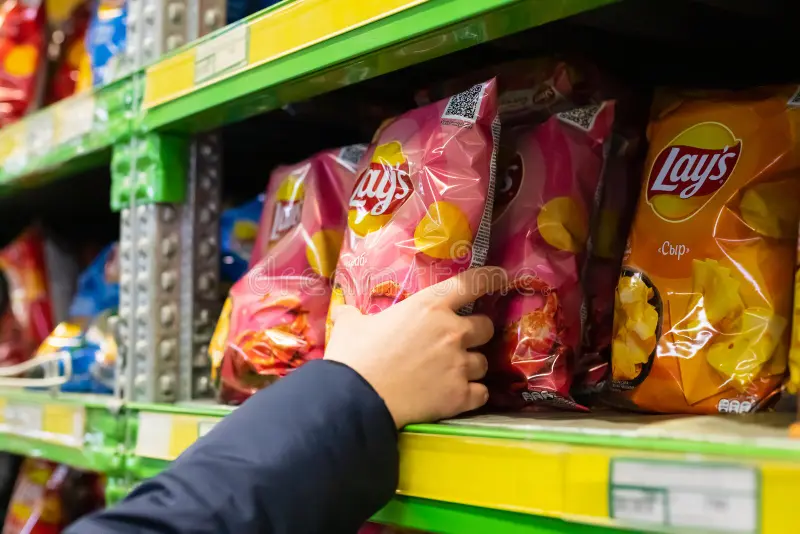As a retailer, trusting the wrong supplier can be costly. One out-of-stock day can result in thousands of dollars in lost revenue. Even though it could sound harsh or exaggerated, this is THE TRUTH.
The FMCG game moves fast. One missed shipment or poor-quality batch, and your store’s credibility takes a hit. In a world where consumers have endless choices and short patience, your supplier needs to be reliable, consistent, and ahead of the market curve.
That’s why choosing the right FMCG food supplier isn’t just good business, it’s survival.
So if you’re a retailer looking to build trust with your customers and boost that repeat purchase rate, this guide is for you. We’ve rounded up 7 of the world’s most trusted FMCG food suppliers – The brands that deliver results, not excuses.
But before we move ahead, let’s understand…
What Makes a Trusted FMCG Food Product Supplier?
If you’ve ever dealt with late deliveries, out-of-stock nightmares, or products that didn’t meet safety standards, you might already understand that “A good supplier shows up, and trusted FMCG suppliers help you grow”. Here’s what separates the best from the rest:
Reliability and Consistency
As a retailer, you want to place an order, get the updates, and have on-time delivery. You should not be the one chasing it. That’s what a great supplier will help you with.
- Your supplier should be able to deliver on time, every time.
- They need to match your pace, especially if you’re offering Q-commerce or working with tight turnaround times.
Product Quality and Safety
Opting for goods of the best quality and safety is what every consumer demands. This is non-negotiable.
- Look for suppliers that carry international and Spanish food safety certifications (like ISO 22000 or IFS Food).
- Transparency in sourcing, ingredients, and manufacturing is key. You can’t afford product recalls.
Innovation and Market Adaptability
Trends change fast, and so should your product shelf.
- The best FMCG suppliers stay ahead of trends.
- They’ll offer new, health-forward, or culturally relevant SKUs (think: plant-based, sugar-free, Mediterranean diet-friendly) before your competitors do.
- Bonus points if they help you adapt to seasonal or regional buying patterns.
Global Reach with Local Support
Big names like Nestlé and Unilever are everywhere, and that’s great.
But when things go sideways—like a shipment delay or a stockout—you don’t want to be stuck waiting on email replies from another timezone.
That’s where local support makes all the difference.
Retailers in Spain need suppliers who not only deliver across the globe but also get how things work here.
Look for FMCG partners with local warehouses, Spanish-speaking reps, and quick-response teams who actually pick up the phone.
Because a brand might be global, but your business is local, and you need both to run smoothly
Now let’s meet the real MVPs—the FMCG food giant retailers around the world rely on.
Nestlé
Whether it’s dairy, water, coffee, or pet food, Nestlé is everywhere in Spanish households. The Swiss giant operates multiple production facilities, including key plants in Girona (coffee and culinary products) and La Penilla (chocolate and milk-based products). These local operations are not just about logistics—they’re part of how Nestlé builds deep trust with Spanish retailers.
Why Retailers Trust Them
- Brand powerhouse: From Nescafé, Nestlé Baby, and La Lechera, to Purina, the product range covers nearly every FMCG category.
- Health-led innovation: Nestlé is continuously adapting to market demand, launching low-sugar, plant-based, and organic variants tailored to the evolving preferences of Spanish consumers.
- Logistics: Local manufacturing ensures faster restocking, minimal customs delays, and fresher products on your shelves.
Nestlé also collaborates with Spanish farmers and suppliers, adding to its credibility as a community-engaged FMCG leader.
Unilever
You’ll find Knorr soups, Hellmann’s mayonnaise, and Calvé sauces in practically every Spanish pantry. But Unilever’s role in the FMCG ecosystem goes far beyond product recognition.
Why Retailers Trust Them
- Ethical sourcing: With sustainability goals that align with EU standards, Unilever is a reliable partner for retailers who care about responsible supply chains.
- Wide network, wide reach: Their robust presence includes regional distribution centers and retail partnerships across modern trade and traditional formats.
- Strong retail support: Unilever’s teams offer co-branded campaigns, product training, and shelf optimization guidance to drive higher retail throughput.
Their mix of legacy products and health-forward SKUs makes them a top choice for retailers balancing heritage and innovation.
PepsiCo
You know Lay’s, Quaker, and Tropicana. Not just these, but PepsiCo also owns Alvalle—a household name for chilled gazpacho that’s made locally in Murcia. This regional customization is what makes PepsiCo a true retail ally.
Why Retailers Trust Them
- Localized investment: With plants and warehouses, including snack production hubs in Burgos and beverages in Barcelona, supply remains consistent and close to demand centers.
- Consumer-driven innovation: PepsiCo frequently releases Spain-specific flavors and formats, especially for the growing health-conscious shopper.
- Aggressive marketing: Their seasonal and regional campaigns (often featuring football and entertainment tie-ins) boost in-store movement and brand visibility.
PepsiCo’s dual focus on global excellence and Spanish consumer habits makes it a no-brainer for store owners.
Mondelez International
The makers of Oreo, Philadelphia, Cadbury, and Belvita, Mondelez, have carved out a solid place in both impulse and regular grocery categories.
Why Retailers Trust Them
- Beloved snack brands: Mondelez offers products with mass appeal, perfect for cross-promotions and high-margin shelves.
- Flexible supply chain: Operating with agility across Spain, Mondelez quickly adapts to local demand surges, seasonal preferences, and packaging innovations.
- Shopper marketing support: Their Spanish retail partners often receive high-quality merchandising kits, POS materials, and promotional tools.
Spanish retailers appreciate how Mondelez combines efficiency with shopper delight, always keeping the shelves attractive and moving.
General Mills
From Mexican meal kits like Old El Paso to health-focused snacks like Nature Valley, General Mills has gained popularity among younger, health-aware Spaniards and multicultural families alike.
Why Retailers Trust Them
- Category depth: Their breakfast cereals (e.g., Cheerios) and snack lines move fast, especially in urban and mid-sized convenience formats.
- Health-forward R&D: General Mills has invested in developing organic, wholegrain, and gluten-free variants tailored to the rising wellness trend.
- Localized marketing: Campaigns in Spain feature culturally relevant messaging and often come with promotional bundling for higher basket value.
Retailers who want to future-proof their shelves with high-velocity SKUs can’t ignore what General Mills brings to the table.
Danone
If you’re stocking dairy or plant-based nutrition products in Spain, you’ve likely dealt with Danone, and for good reason. With Spanish R&D hubs like the Barcelona Innovation Center, they develop and refine products specifically for this market.
Why Retailers Trust Them
- Health & wellness leadership: From Actimel to Alpro, Danone’s range fits perfectly with Spain’s growing demand for gut-health and vegan products.
- Strong consumer loyalty: Spanish families trust Danone for baby nutrition, yogurts, and hydration, making it a dependable volume mover.
- Responsible business practices: As a Certified B Corp, Danone is committed to sustainable production, fair sourcing, and transparency.
Their deep integration with Spanish food culture and values gives retailers both reputation and reach.
Kellogg’s
Whether it’s breakfast or snacking, Kellogg’s dominates categories with high repeat purchases and dependable turnover. They’ve also adapted their lineup to reflect local trends and dietary needs.
Why Retailers Trust Them
- Pantry staples: From Corn Flakes to Special K and Pringles, their products have strong staying power in every type of store—from supermarkets to petrol station outlets.
- Inventory ease: Long shelf life and compact SKUs make them retailer-friendly from a logistics and planning perspective.
- In-store execution: Kellogg’s supports Spanish retailers with promotional standees, bundles, and visibility materials to drive impulse purchases.
They’re a classic example of a global brand that understands and delivers on local expectations.
So, How Do You Choose the Right FMCG Supplier?
It’s not just about brand recognition. Here’s what to evaluate:
- Certifications: IFS, ISO, BRC, or local AECOSAN compliance.
- Local Warehousing: If your supplier operates distribution centers, it’s a win-win.
- Support Team: Can you reach someone fast when an issue arises? If yes, that’s the supplier you can trust.
- Retailer Resources: Who doesn’t love a few extra perks? Some suppliers offer merchandising help, training, and even free POS kits. These added benefits don’t just make shelves look better; they boost product visibility, improve shopper experience, and ultimately help you sell more.
- Track Record: Checking the record helps. Ask for references from other retailers, and only then make a decision.
Choosing the right FMCG supplier isn’t a checklist task. It’s about finding partners who grow with you, solve for you, and innovate with you.
So whether you’re an independent grocer or managing large-format stores, align with suppliers who treat your business like their own.
FAQs
What should retailers look for in an FMCG food product supplier?
Focus on consistency, food safety certifications, local support, and adaptability to changing market trends.
How can I verify a supplier’s reliability?
Check for third-party certifications, review their on-time delivery history, and speak with existing retail partners.
Are global suppliers better than local ones?
Not necessarily. Global suppliers offer scale and range, while local ones often give faster service and niche customization. The best strategy? Use both.
What are the benefits of working with multiple suppliers?
It reduces risk, increases variety, and gives you leverage in negotiations. Just ensure coordination to avoid supply chain issues.
How do supplier partnerships impact profitability?
The right partner helps you optimize inventory, reduce shrinkage, and improve consumer satisfaction—all of which boost your bottom line.



